November 10, 2021
WARNING: This story contains graphic content.
On the second floor of a Maryland courtroom, Patrik Mathews, clad in an orange prison jumpsuit, his long hair and beard reaching past his shoulders, stood before Judge Theodore Chuang and made a statement.
Four rows away, in the back of the courtroom, sat Winnipeg Free Press reporter Ryan Thorpe writing as quickly as he could.
- Listen to Episodes 1 and 2 of the CBC podcast White Hot Hate, hosted by Michelle Shephard
"This is a little difficult for obvious reasons," Mathews, a former Canadian Army reservist, told the court, as he flipped his hair out of his face. "I got involved with the wrong people. What else is there to say?"
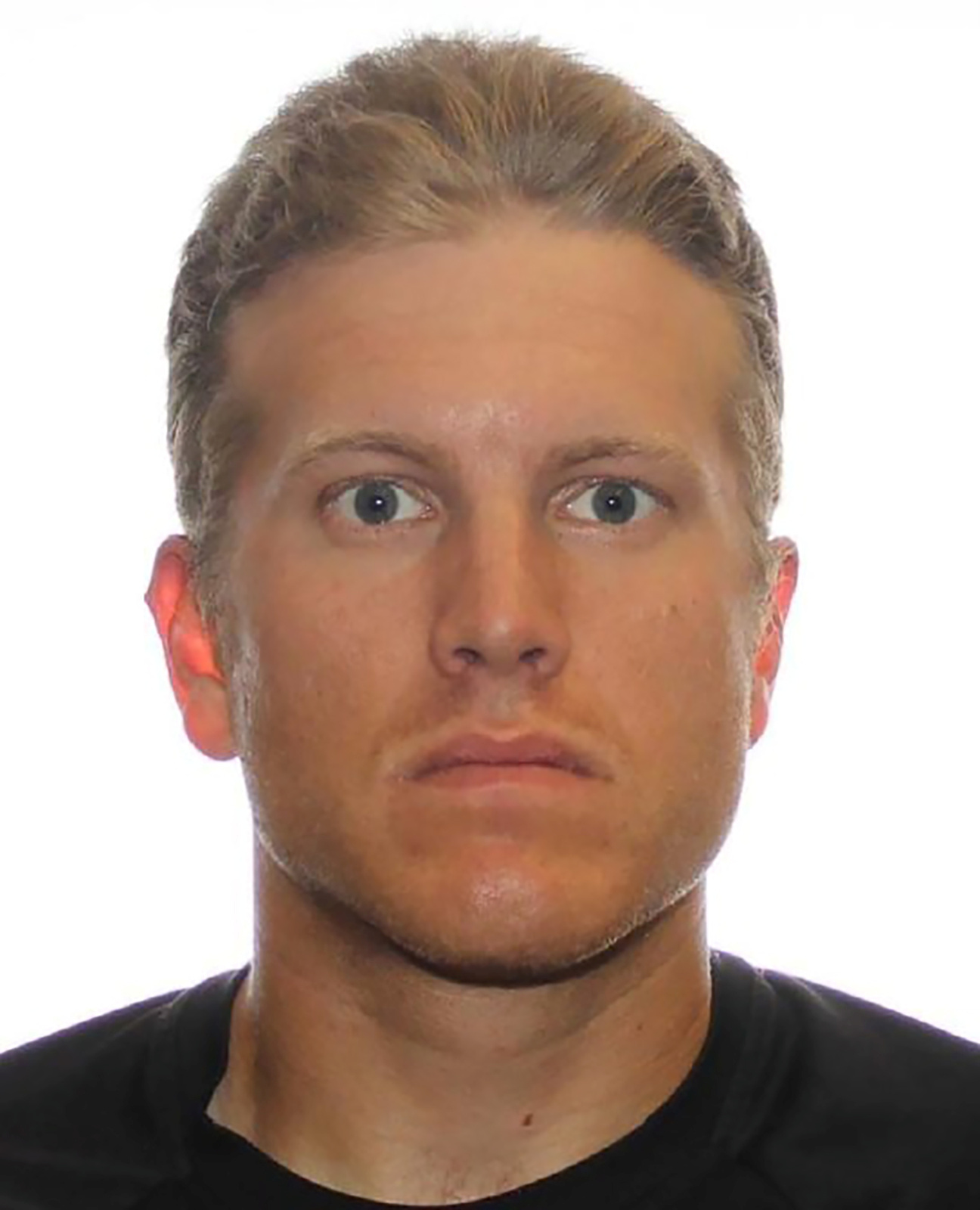
But he continued for about five minutes, at times gesticulating with his hands, pausing as he got emotional, to explain why he left Manitoba and joined American members of The Base, a white supremacist group that is designated a terrorist entity in Canada.
Mathews fled Canada following an undercover investigation by Thorpe that outed the 26-year-old army reservist on the front page of the Free Press as a local recruiter for The Base.
"I tried to fit in, to be the most extreme, cool guy," Mathews said, in advance of Chuang handing down his nine-year sentence for firearms offences related to a neo-Nazi plot to instigate a race war in the United States. "It sounds crazy because it is."
I.
What ended in that courtroom in late October began in the summer of 2019 in Thorpe’s hometown of Winnipeg.
Thorpe, also then 26, was a general assignment reporter who covered various beats, although he was the paper’s go-to guy on crime stories. That day, the city editor passed on a tip.
"There was a woman walking down the street in the St. James area of Winnipeg ... and she noticed this poster that said: 'Save Your Race. Join The Base,' " said Thorpe. "She took a closer look at it. And she believed it to be a kind of recruitment poster for a white nationalist group."
Thorpe started his investigation by digging into social media, and he quickly discovered that the posters weren’t an isolated incident. Others were taking photos of flyers that were popping up around the city. Some contained imagery adopted by the Nazis or had sketches of face masks depicting skeletal jaws, which are part of the iconography of violent far right groups.
Thorpe had never heard of this group — The Base — and couldn’t find much information online apart from a 2018 VICE investigation with the headline: “Neo-Nazis Are Organizing Secretive Paramilitary Training Across America.”
Had they moved into Canada?
WATCH | A reporter infiltrates an international neo-Nazi extremist network:
Thorpe, keen to keep digging, pitched to his editor that he go undercover, suggesting he could "just reach out to them and ask for more information. Pretend to be a white nationalist that's potentially interested in joining up."
So Thorpe became Mark, a university student who wanted to take his interest in the ideology to the next level. He created a fake email account and wrote to the contact on the poster. The response was immediate.
The emailing quickly moved to texting on an encrypted app with someone using the pseudonym Roman Wolf. He set up a time for Mark to be vetted by phone, and Thorpe prepared as best he could, writing out “cheat sheets” for his undercover persona and other information he might need if pressed.
But just before the call, he got a text to say there would be other members from The Base listening in, something Thorpe found unnerving.
"Because one: it had just caught me off guard, and two: I was thinking I only had to convince one person and now I had to be convincing to, you know, six or seven," Thorpe said.
The call, however, went off without a hitch, with only Roman Wolf doing the talking until right near the end, when a new voice cut in.
"It sounds like you’re interested," the new voice said, according to Thorpe’s recording of the call. "The person who may or may not have been putting those posters may or may not have been me. So that person who’s active, so to speak, in your area, may or may not be me."
Thorpe had found the Winnipeg connection.
II.
Followers of The Base, which was declared a terrorist entity in Canada in February 2021, adhere to an ideology known as "accelerationism." According to pronouncements made by the group, they believe that the white race is at risk, and there is no political solution, so they attempt to accelerate the collapse of government and society through acts of violence. Once chaos reigns, they believe a race war will begin and their "vanguard" will establish a white ethnostate.
The Base’s roots can be traced back to another group known as Atomwaffen Division. Atomwaffen, which means "atomic weapons" in German, emerged in 2016 on a now-defunct online forum called Iron March.
According to the Southern Poverty Law Center (SPLC), a non-profit legal advocacy group based in the U.S. specializing in civil rights, Atomwaffen drew direct inspiration from, among others, the writings of James Mason, an American neo-Nazi who is a towering figure to accelerationists, and has been designated a terrorist in Canada. The group’s aim was to establish a series of terror cells with the goal of bringing down society with targeted violent acts.
"Iron March was meant to be the place where the most extreme of the extreme white power activists could go. This is the place where they were going to create the most pure form of fascism," said Cassie Miller, a senior research analyst at the SPLC’s Intelligence Project. "They really encouraged people to talk openly about violence and revolution and to embrace Hitler."
WATCH | What is the ideology known as 'accelerationism?'
It was in the wake of the chaotic 2017 Unite the Right rally in Charlottesville, Va., where 32-year-old Heather Heyer was killed, that Atomwaffen grew in popularity and copycat groups like The Base emerged. Heyer died after a white supremacist drove his car into a crowd of peaceful counterprotesters.
Contrary to its name, said Miller, the Charlottesville rally splintered the far right movement, separating the most fatalistic from the rest.
"It caused a huge amount of infighting ... it became clear that maybe the public wasn’t going to be as friendly to them as they had hoped," said Miller. "And groups like Atomwaffen were there to welcome the disillusioned alt-righters."
Around this time, someone on Twitter under the name of Norman Spear was echoing Atomwaffen’s message that the white race was at risk, and there was no political solution. One of his posts read: "Fuhrer, you were only the beginning. We will finish what you started. It’s not over yet — we will carry the torch."
Norman Spear started to gain a small following and began to recruit.
He also had another pseudonym: Roman Wolf.
III.
Thorpe’s investigation into The Base's presence in Winnipeg moved quickly. After the call and more texting, he was told to meet the local representative in person.
Thorpe chose a relatively public area, Whittier Park, and went posing as Mark. Nervous, he decided to leave his wallet at home so he wouldn’t have any identification that could be checked. He shaved his mustache, hoping the man he was meeting wouldn’t recognize him from his newspaper headshot. He covered his tattoos with a long-sleeved shirt.
"On the insides of my arms, I have these like two circles with these little kinds of flowers. One's a black rose. One's like a sunflower. But that's the veganism symbol," said Thorpe. "And yeah, I just think that that's probably not the type of tattoo that ... some hardcore macho neo-Nazi would probably have."
Soon after they met, the man asked if he’d like to dispense with pseudonyms. Thorpe agreed, and told him his name was Ryan. The man introduced himself as Patrik.
Over the next 90 minutes, Patrik told him about The Base. Thorpe tried to keep him talking.
"He reveals to me that he joined the military at 18," Thorpe said. "And then he tells me he was a combat engineer and he starts explaining a little bit about what combat engineers do, and he specifically references explosive work."
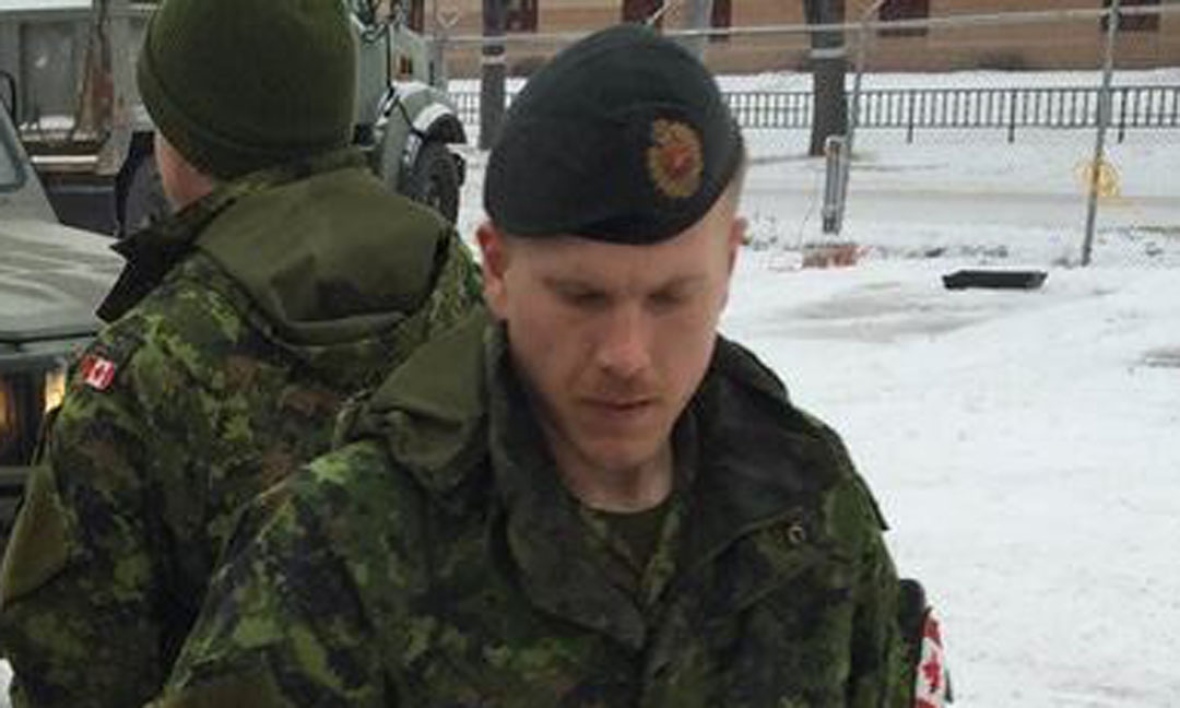
At one point, Patrik asked Thorpe to don a skull mask and pose for a photo so Roman Wolf would know they met. They posed near a rail line, which prompted Patrik to talk about how you could attack it, Thorpe said.
"Like even if you didn't want to make that go boom," Thorpe recalled Patrik saying, "you could do X, Y and Z ... pulling up one of the sides of the rail line to derail a train."
Patrik also told Thorpe some personal details, including the fact that he once had a Black girlfriend.
"And the sense I get when he's opening up to me about this is like he's confessing something or he's like unburdening himself a little bit." Patrik told Thorpe that they had a pregnancy scare, and that worried him because his baby would be "half human."
"This is the level of racism that ... this guy has fallen into. These are the depths of his bigotry," said Thorpe.
Thorpe watched Patrik as he left their meeting, getting into a red pickup truck with a dented driver's side door. As soon as he was out of sight, Thorpe rushed home as quickly as he could, recording all his notes on his phone as he jogged.
He didn’t yet know the man’s identity — but he had enough for a story.
About two weeks later, Thorpe’s scoop ran on the front page of the Winnipeg Free Press, under the headline "Homegrown Hate."
Less than 24 after the story posted online, he got a tip and was on the phone with someone who said he knew who Patrik was because he had trained with him in the Army reserves.
His full name, the tipster told Thorpe, was Patrik Mathews.
And Thorpe published the next story in his investigation.
IV.
Thorpe wasn’t the only one going undercover to expose members of The Base. The organization had a mole among the upper echelons of the group, someone who had gained the trust of the group's founder, the man who went by the monikers Roman Wolf and Norman Spear.
The insider recorded more than 100 hours of vetting calls from all over the world and leaked them to the Southern Poverty Law Center and a handful of media outlets, including the CBC. The calls provide an unfiltered look at the group and who they were trying to recruit.
"I am a licensed firearms owner. I have a clean record with the police. I have been part of several white nationalist movements," James Jameson from Australia told Roman Wolf.
Twenty-six-year-old Napola said he had served in the German army. Others from Canada and the U.S. can be heard making racist and Islamophobic slurs, all wanting to join this "vanguard."
In early 2020, investigations by The Guardian newspaper and the BBC uncovered that Roman Wolf was in reality an American named Rinaldo Nazzaro, a former U.S. military contractor who was living in St. Petersburg, Russia.
In a lengthy interview over an encrypted phone app from Russia, Nazzaro told the CBC that he doesn’t promote violence and that he created The Base as a survivalist, "prepper" network.
He claimed he opposed the neo-Nazi, white supremacist or Islamaphobic labels.
"What I have an issue with is the way that the issue of race and identity politics is being weaponized against white people," he said.
And yet on the vetting calls and in leaked internal chats, Nazzaro encouraged some of the would-be recruits, even after they had praised Brenton Tarrant, who killed 51 Muslim children, women and men in the 2019 Christchurch, New Zealand, attacks, or Anders Behring Breivik, who killed 77 people in 2011, including dozens of teenagers attending a Labour Party youth camp on the island of Utoya in Norway.
When pressed on that issue, Nazzaro said he didn’t condone the attacks but that these recruits expressed a "militant mindset that we need." Nazzaro claims he had been in contact with Mathews after he was outed by Thorpe in the Free Press and tried to calm him down.
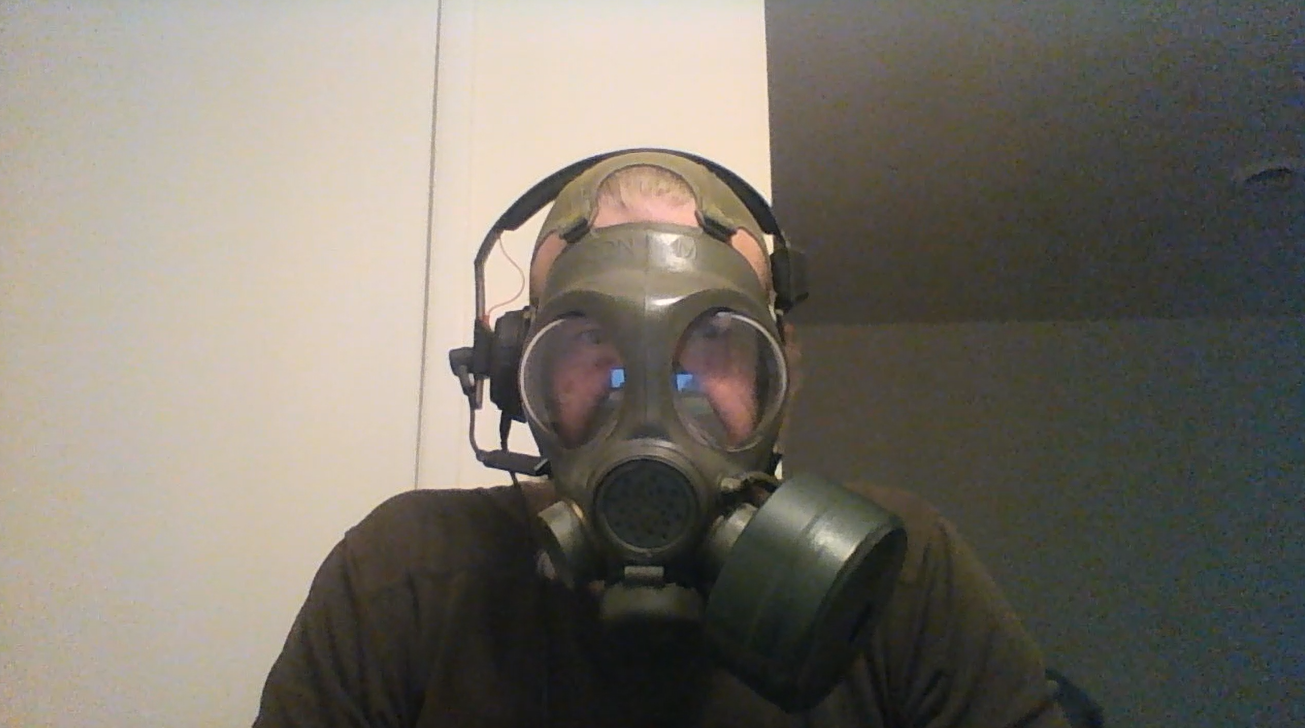
Meanwhile, prompted by the publication of Mathews’s name, numerous people who knew him contacted the RCMP, saying they were worried that Mathews was planning something.
The police were told, "Patrik is online a lot," making hateful comments, said one acquaintance, conceding they thought it was all "talk" until Mathews's posts began "escalating and getting weirder and weirder over the last three to four weeks."
"Patrik had four cats that he loved and talked about all the time but out of nowhere, got rid of them all last week," Cpl. John Richard Hurley, a member of the RCMP's national weapons enforcement support team, wrote in an Aug. 19, 2019, sworn affidavit to a judge. While giving up his pets may have an innocent explanation, it's not uncommon for those about to commit crimes to settle up personal affairs, Hurley noted.
This information, along with Thorpe’s investigation, was enough for a judge to grant the RCMP a search warrant (CBC went to court to fight for access to the search warrant documents. A copy of the "information to obtain," or ITO, was provided last month. The names of the people who came forward and their relationships to Mathews are redacted.)
An RCMP swat team raided Mathews's home in Beausejour, Man., the same day Thorpe's story ran. Mathews was detained briefly but later released.
"He was panicking to a certain extent because of all the media pressure. I mean, his home was raided. Nothing illegal was found," Nazzaro said. "It was brought to my attention, one of his plans was to come to the United States." Nazzaro claimed he told Mathews that was a bad idea.
But that’s exactly what Mathews did, abandoning his truck near the border in Sprague, Man., and crossing by foot into the U.S.
V.
Mathews would be on the run for about five months, after crossing the border illegally into the U.S. And while he had fled an investigation in Canada, little did he know he'd walked right into a much larger, more sophisticated one already underway in the U.S.
In January 2020, he was arrested in Delaware and later indicted by a grand jury in Maryland on various weapons charges and an obstruction of justice charge in connection with an attempt to flush his phone down the toilet just before his arrest.
According to documents filed in the Maryland District Court, about 10 days after Mathews left Canada, he was picked up by two American members of The Base in southern Michigan.
One of them, Brian Lemley Jr., an American army veteran who served in Iraq, continued to drive Mathews to a location in Virginia, later telling other Base members online that "the objective has been reached," and that Mathews now had a burner phone at his disposal.
Eventually, Mathews and Lemley Jr. found their way to Floyd County, Ga., where they attended a so-called "hate camp" on the family property of Luke Austin Lane, then 21 years old. The Base had regularly been holding these training meet-ups, where members could shoot guns, run through paramilitary-style drills and produce photo and video propaganda.
However, at this particular camp, held around Halloween 2019, the dozen or so attendees also included an undercover FBI agent posing as a member. When Mathews and Lemley Jr. left the camp, they drew the increased law enforcement attention with them.
Settling into an apartment Lemley Jr. had rented for the both of them in Delaware, they were soon subject to a "sneak-and-peek" search warrant, and the FBI also installed covert CCTV and microphone surveillance.
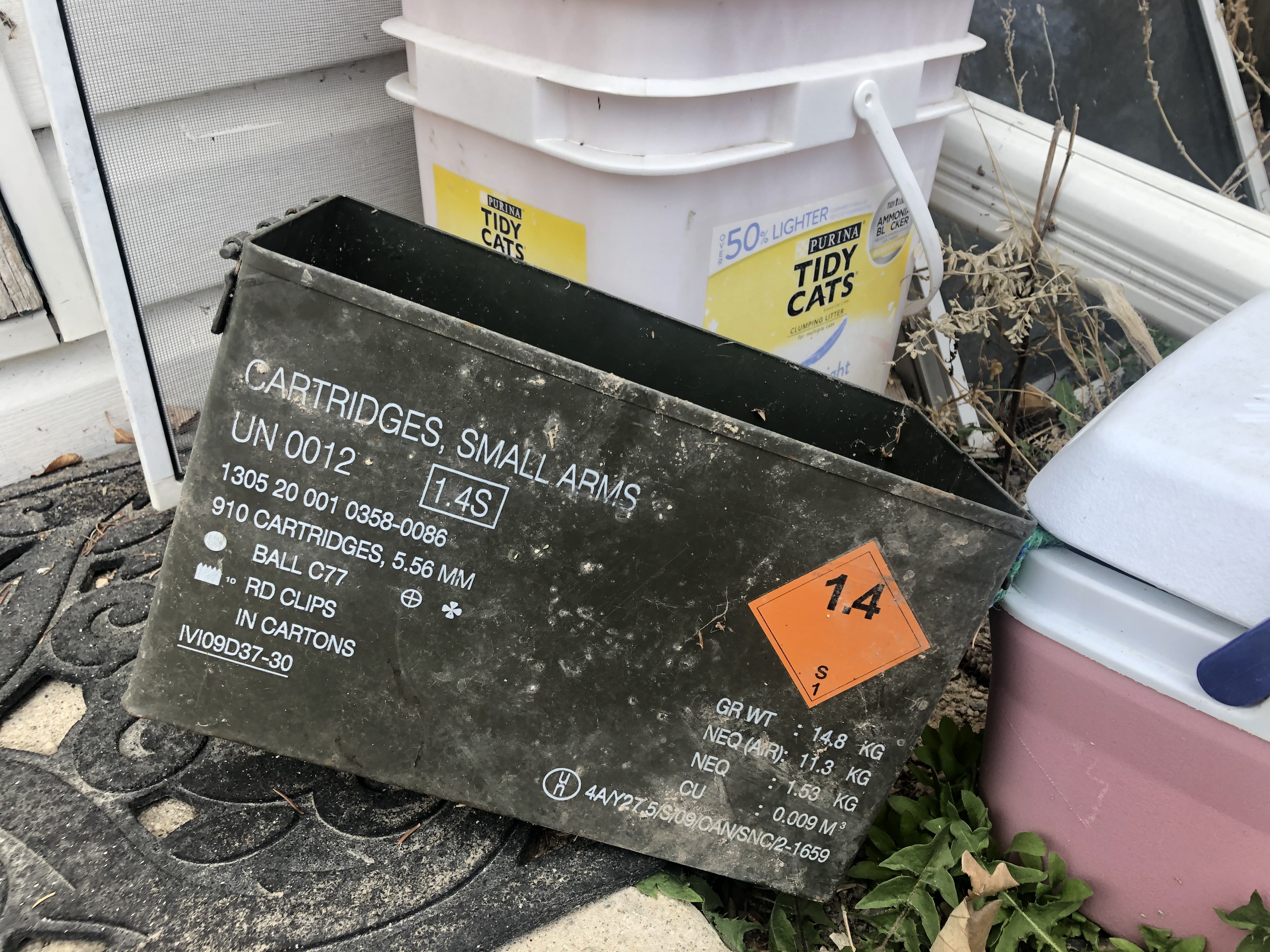
Federal agents found a sniper rifle and what appeared to be the components necessary to build an assault-style "ghost gun" — homemade and untraceable. They also found white supremacist literature, The Base propaganda, survivalist gear such as camouflage fatigues and a large number of MREs, or "Meals Ready-to-Eat."
And they found self-recorded videos of Mathews ranting in violent, anti-Semitic and racist language. In one, he says: "They want bad guys so bad, they can have it…. We will give them white supremacist terrorists, if that’s what they want. Give them what they want. Give them what they deserve."
For more than a month, law enforcement recorded Lemley and Mathews discussing various violent acts at events and locations across the U.S. According to court documents, the men were particularly "enamoured" with a pro-gun rally in Richmond, Va., on Jan. 20, 2020. They believed it would be their "boogaloo," a term used by The Base members to describe the event they hoped would spark chaos and lead to a race war.
Lemley and Mathews "believed that, once the boogaloo began, the defendants and other like-minded confederates would begin systematically murdering and destroying in order to bring capitulation by, and the demise of, the United States government," states the U.S. government’s memorandum in aid of sentencing.
Just days before the protest, Mathews, in the presence of the undercover FBI agent, said one plan was "to go down there, wait on the outskirts of the city, wait for violence to break out and then we would just start having … some fun."
The FBI moved in, arresting Lemley and Mathews and five other alleged members of The Base in Wisconsin and Georgia.
VI.
Thorpe was sitting in the courtroom during Mathews's first appearance in the winter of 2020, about six months after he had exposed his affiliation with The Base.
"And as he's being led in, he's kind of scanning the crowd a little bit. And, you know, I swear to God, like, he just zooms in on me, and like our eyes lock and there's like a sense of recognition there. And it seems pretty clear to me that he realizes, you know, who I am, that he remembers me," Thorpe said.
"The other thing that really sticks out was his demeanour in that proceeding. It was defiant. It was like he didn't accept the legitimacy of the proceedings…. He was kind of leaning back, reclining in his chair."
When it’s read into the court record that Mathews had recorded a video encouraging others to "poison some f--king water supplies; derail some trains; murder some people," Thorpe watched as Mathews chuckled to himself. He pleaded "not guilty."
But more than a year later, at another hearing on June 10, 2021, Thorpe said Mathews came into court with a starkly different attitude. "He was quiet, he was reserved. He was respectful. He constantly used 'your honour,' " Thorpe said. "The responses he gave were just perfunctory."
During that hearing, Mathews changed his plea to "guilty" on two counts of being an illegal alien in possession of a firearm and one count of transporting a firearm over state lines with the intent to commit a felony. He also pleaded guilty to one count of obstruction of justice.
And then, late last month, with his parents in the courthouse, Mathews was sentenced to nine years. The prosecution and defence had argued earlier in the week as to whether a terrorism sentencing enhancement would apply. The judge ruled it would.
Mathew's father, Glen, made an emotional speech to the court before Chuang issued the sentence. He described how this was a "devastating time for myself and my family." His voice broke when he talked about his son's compassion for animals, and said the evidence presented in court was "not the son I know and love unconditionally."
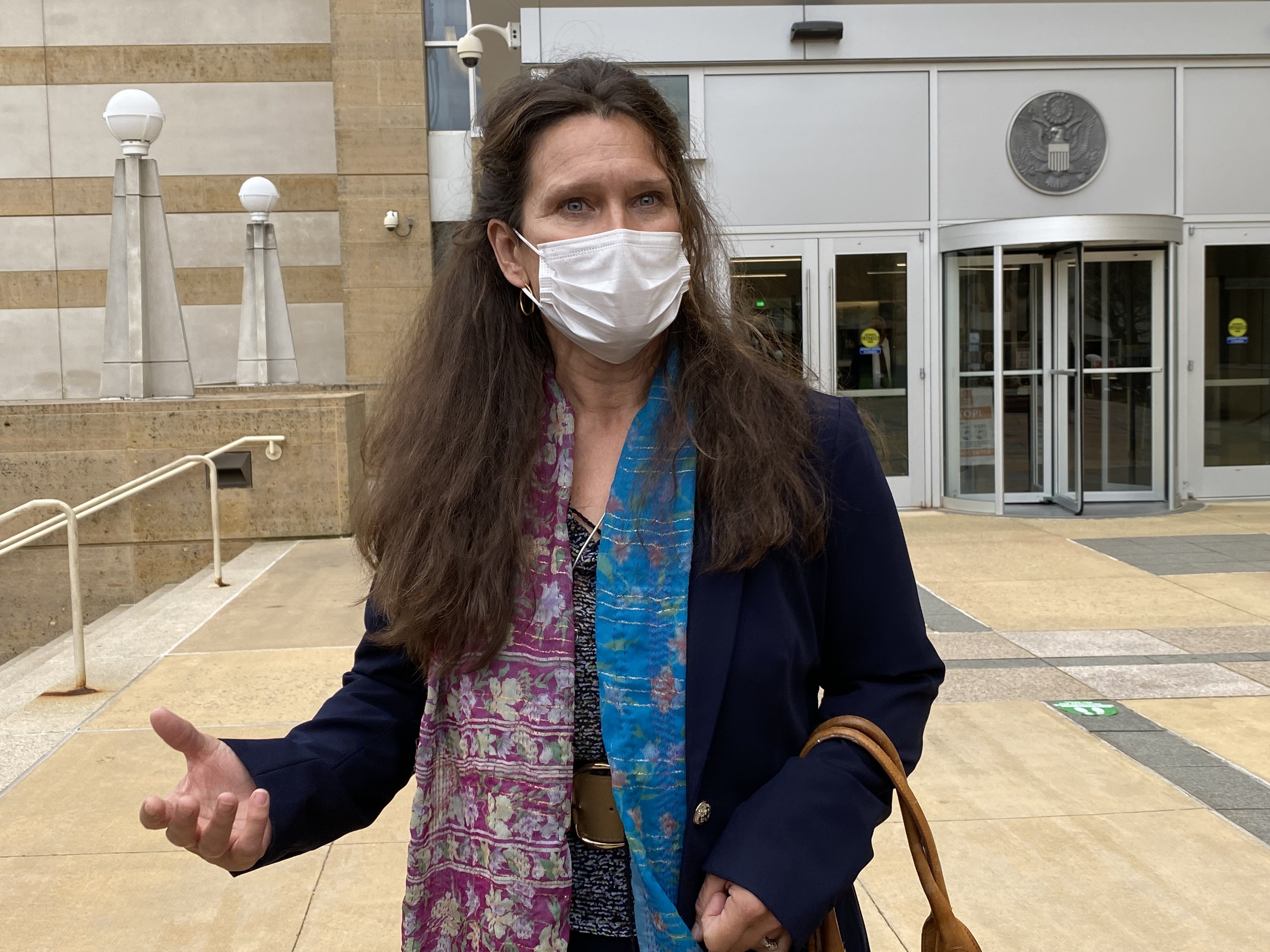
He told the court he did not believe his son was racist. "The good thing is the Pat I know is still here … me and my family will never give up on him. We will never stop loving him."
During Mathews’s statement to the court, he lamented his decision to leave Canada. "Once I made the mistake of jumping over the border … I tried to fit in with people, and you adapt to their beliefs," Mathews said, laughing sadly.
He ended by saying he would like to quote a lyric sung by Canadian singer Michael Bublé. "I wanna go home," he told the judge.
But Chuang, in his final remark, seemed unswayed by arguments that Mathews’s behaviour was "just talk" or that he had been led by U.S. members of The Base.
"Frankly, I did not hear any particular apology to our country," he said to Mathews. "To me, it's galling that someone who's not an American would presumably think that you would know better than us what kind of country we should have here and decide that they hate America so much, infiltrate our country and try to harm yourself in an effort to tear it down.
"I also note that in the letter that you submitted, you didn't necessarily inspire confidence that you've changed the point that there's no longer a threat of violence from you, including your quotation of Mr. Nietzsche."
Mathews's letter to the judge remains sealed, but citing German philosopher Friedrich Wilhelm Nietzsche, whose writings were often co-opted by Nazi ideologues, seemed at the very least an odd choice.
"You have stated today," Chuang said, "that all you want to do is go back to Canada, live a normal life, mend relations with your family.… Once you serve this sentence, if you want a normal life, be deported back to Canada and you'll be able to try to do that."
But Chuang underscored the severity of the crime Mathews had committed. "You may have had a hateful ideology — hoping that you don't anymore — but you certainly did. That is not a crime," Chuang told him as Mathews stood, his arms behind his back.
"But when you come illegally to the United States, engage in unlawful weapons activities, all with the intent to use these weapons to engage in violent efforts to kill law enforcement officers to bring down our government, there does need to be a severe punishment.
"This is not actually that different than someone coming to our country from another part of the world, hates America for different reasons, slipping into our country and assembling arms with the intent to commit terrorist acts."
- Listen to Episode 3 of the CBC podcast White Hot Hate, hosted by Michelle Shephard
As the proceedings wrapped up, Mathews was led out in handcuffs, not looking back into the courtroom gallery.
Thorpe left the court and filed his next story.
When asked about Mathews’s sentence, Thorpe replied: "My instinct as a reporter is that it's not the job of journalists to adjudicate these sorts of issues. That's a matter for a jury, for a judge, for the court process and ultimately, these are crimes that were committed, not even in my own country, right?"
But he noted that Chuang seemed very aware that the sentence and the message it sent would reverberate beyond the walls of the courtroom.
"Part of his consideration seemed to be the context, the political context in the United States right now," Thorpe said.
"He explicitly said that given the fact that political violence and terrorist activity is on the rise … given the fact that people are willing to storm the seat of government, it raises the importance of a severe punishment."
